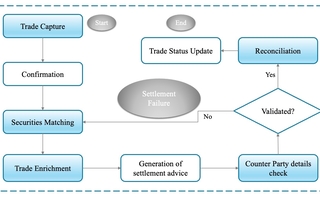UBS found no advantage in quantum computing—ex data chief
The Swiss bank tested various use cases in its trading business before giving up on the technology.

UBS abandoned a multi-year effort to utilize quantum computing for trading after concluding that it offered no significant advantage over existing technologies, according to the person who led the project.
“We ran Monte Carlo simulations against market data, we ran volatility curves, and what we were trying to do was simply use the technology to get an exponential ‘back out’—something that would give us a competitive advantage,” said Lee Fulmer, who was chief data officer and head of the innovation lab at UBS until March.
The aim was to speed up the bank’s models, but Fulmer said UBS’s experiments failed to produce any meaningful results: “In investment banking you live and die by microseconds. The end result of all of that effort was that we found we weren’t getting a substantive uplift.”
The end result of all of that effort was that we found we weren’t getting a substantive uplift
Lee Fulmer, formerly of UBS
Fulmer was speaking at a conference hosted by The Economist on May 17.
Quantum computers can complete calculations much faster than classical computers by exploiting the properties of subatomic particles, such as electrons and photons. A bit, or unit of information, in a digital computer can be in one of two states: either a one or a zero. A quantum bit, or a qubit, can exist in both states simultaneously, meaning the computers can theoretically handle a far higher number of calculations.
Proponents of the technology claim it can turbo-charge existing financial models, including those based on machine learning. But Fulmer, who is currently independent chair of the Bank of England’s reporting and data standards transformation board, and previously worked at JP Morgan and IBM, said he is yet to find a convincing use case in finance despite “playing with quantum computers now for nearly 15 years now”.
It is not for a lack of trying. UBS went to great lengths to test the uses of quantum computing—even conducting experiments with UK spy agency GCHQ in 2019. Another project, carried out when Donald Trump was president, involved feeding Twitter data into a quantum computer to analyze “how that was affecting markets and commodities to predict literally in microseconds the correlation to volatility”.. The results were disappointing. “We weren’t able to get any substantial uplift over what our existing algos were able to do,” said Fulmer.
His conclusion is that financial models are “linear” and will not benefit from the capabilities of quantum computing. “That’s the way we look at problems. And actually, as human beings, we are binary—we are not wired to be able to think about two states at the same time,” Fulmer said. “I think until we get to a phase where we have true business problems that can be bifurcated in real-time, we’re not going to be able to ask the right questions.”
Other banks that are in the early stages of experimenting with quantum computing are more bullish on its potential. A recent JP Morgan study found the technology could nearly double the effectiveness of its machine learning based hedging strategies. Researchers at IBM and Barclays have claimed it can dramatically speed up securities settlement cycles. ABN, ING and Rabobank have trialed the use of quantum computing in regulatory stress tests, while Standard Chartered teamed up with US space agency Nasa to explore uses in portfolio allocation, and exchange operator Deutsche Börse is testing whether it can be used to model business risks.
Asked directly if his view was that quantum computing had no real value in finance, Fulmer responded: “Yes. If we look at how quantum computing started to evolve out of the ‘90s, alongside blockchain, alongside VR [virtual reality], we have the same sorts of challenges with those. They are technical solutions for business problems that don’t exist.”
Only users who have a paid subscription or are part of a corporate subscription are able to print or copy content.
To access these options, along with all other subscription benefits, please contact info@waterstechnology.com or view our subscription options here: http://subscriptions.waterstechnology.com/subscribe
You are currently unable to print this content. Please contact info@waterstechnology.com to find out more.
You are currently unable to copy this content. Please contact info@waterstechnology.com to find out more.
Copyright Infopro Digital Limited. All rights reserved.
You may share this content using our article tools. Printing this content is for the sole use of the Authorised User (named subscriber), as outlined in our terms and conditions - https://www.infopro-insight.com/terms-conditions/insight-subscriptions/
If you would like to purchase additional rights please email info@waterstechnology.com
Copyright Infopro Digital Limited. All rights reserved.
You may share this content using our article tools. Copying this content is for the sole use of the Authorised User (named subscriber), as outlined in our terms and conditions - https://www.infopro-insight.com/terms-conditions/insight-subscriptions/
If you would like to purchase additional rights please email info@waterstechnology.com
More on Emerging Technologies
Quants look to language models to predict market impact
Oxford-Man Institute says LLM-type engine that ‘reads’ order-book messages could help improve execution
The IMD Wrap: Talkin’ ’bout my generation
As a Gen-Xer, Max tells GenAI to get off his lawn—after it's mowed it, watered it and trimmed the shrubs so he can sit back and enjoy it.
This Week: Delta Capita/SSimple, BNY Mellon, DTCC, Broadridge, and more
A summary of the latest financial technology news.
Waters Wavelength Podcast: The issue with corporate actions
Yogita Mehta from SIX joins to discuss the biggest challenges firms face when dealing with corporate actions.
JP Morgan pulls plug on deep learning model for FX algos
The bank has turned to less complex models that are easier to explain to clients.
LSEG-Microsoft products on track for 2024 release
The exchange’s to-do list includes embedding its data, analytics, and workflows in the Microsoft Teams and productivity suite.
Data catalog competition heats up as spending cools
Data catalogs represent a big step toward a shopping experience in the style of Amazon.com or iTunes for market data management and procurement. Here, we take a look at the key players in this space, old and new.
Harnessing generative AI to address security settlement challenges
A new paper from IBM researchers explores settlement challenges and looks at how generative AI can, among other things, identify the underlying cause of an issue and rectify the errors.







